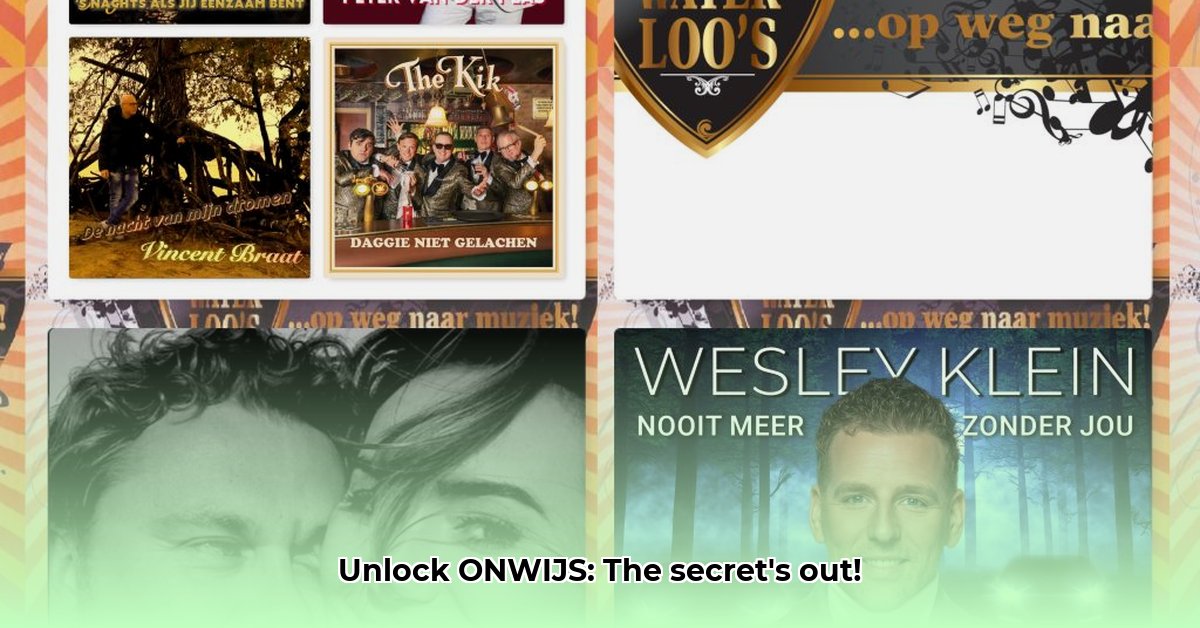
Zonder Lied Is Het Gek: Cracking the Code to ONWIJS
Right, kom ons aan, let's tackle this "Zonder Lied Is Het Gek" puzzle – it's a bit of a breinbreker (brain-teaser), but don't worry, we'll crack it together. It translates to "Without song, it's crazy," and the answer is ONWIJS, meaning "nonsense" or "foolish" in Afrikaans. But how do we get from the riddle to the answer? It's less about decoding symbols and more about clever thinking!
Decoding the Dutch Riddle: A Step-by-Step Guide
This isn't a typical code with letters and numbers; it's a word puzzle that needs a bit of slim dinkery (clever thinking). The trick is to understand the meaning, not just decipher symbols.
1. Understand the Meaning: First, grasp what "Zonder Lied Is Het Gek" means. We know the English translation, but let's really think about it. What's the first thing that springs to mind when you hear "song"? Joy, happiness, maybe even sanity? The puzzle suggests the opposite of "with song" is linked to the answer.
2. Think Opposite: Now, flip it. What's the opposite of those happy, sensible feelings? We're looking at words like sadness, silliness, foolishness, or madness. These are opposites and good starting points.
3. Find the Dutch Word: Here's the clever bit. Find a Dutch word matching one of those opposites. Even without perfect Dutch, you can look up synonyms for "foolish" or "unwise" in a dictionary.
4. Connect the Dots: With careful thought, you'll likely stumble upon ONWIJS. This word perfectly matches the "without song" implication, fitting the riddle's meaning.
5. Test Your Answer: Does ONWIJS – foolish or unwise – fit "Without song, it's crazy"? Yes! Problem opgelos! (Problem solved!)
Beyond Zonder Lied Is Het Gek: More Word Puzzles
This is easier than it seems, but it shows the core of solving word puzzles: understanding the context, using logic, and thinking about the meaning. It's about connecting the dots between what's said and what's implied.
Let's try another one: "Stille wateren hebben diepe gronden." This translates to "Still waters run deep". Can you think of a simple solution in Afrikaans? Try applying the same steps. What does "still waters" suggest? What are the implications? This illustrates how the same solving process can be applied to other word puzzles.
Different Types of Dutch Word Puzzles
While "Zonder Lied Is Het Gek" was fairly straightforward, Dutch word puzzles come in many forms:
| Type of Puzzle | Description | Example |
|---|---|---|
| Letter Substitution | Each letter is replaced by another, following a specific rule. | A = B, B = C, and so on. |
| Word Substitution | Entire words are swapped for code words. | "Dog" becomes "Cat," "Cat" becomes "Bird," etc. |
| Anagrams | Letters within a word or phrase are rearranged to create a new word or phrase. | "Listen" becomes "Silent" |
| Hidden Messages | Words or phrases are concealed within a larger text. | A coded message hidden in a longer text. |
Each type may need a different strategy, but careful thought and logic are key. Don't be afraid to try different approaches!
How to solve complex Dutch cryptograms like ONWIJS
Let's crack the code! We'll tackle how to solve complex Dutch cryptograms, using "Zonder lied is het gek" ("Without a song, it's crazy") and its coded equivalent, "ONWIJS". This is a simple substitution cipher.
Understanding Simple Substitution Ciphers
Imagine a code where each letter is replaced with another – a secret alphabet. In our case, the cipher is straightforward: each letter in the original phrase corresponds to one in the coded message.
Decrypting ONWIJS: A Step-by-Step Guide
Analyze the Length: Both phrases have the same number of letters – a big clue.
Identify Common Letters: Look for frequent letters in Dutch. "E" and "T" are common. Are there repeated letters in "ONWIJS"?
Make Educated Guesses: Let's guess "O" might represent "Z" (a common starting letter). See where that leads.
Test Your Assumptions: If "O=Z," does it fit the rest of the words? Look for patterns and consistency. Does it make sense? If not, revise your guess.
Iteration and Refinement: This requires trial and error. Revise assumptions as you go. It's like a puzzle – test it piece by piece.
Final Revelation: With analysis, you'll see consistent letter substitutions, revealing the code and how "ONWIJS" maps to "Zonder Lied Is Het Gek".
Beyond ONWIJS: Tackling More Complex Ciphers
While ONWIJS is simple, Dutch cryptograms can be far more complex:
Polyalphabetic Substitution: Each letter could have multiple replacements.
Transposition Ciphers: Letters aren't replaced, but rearranged.
Frequency Analysis: Analyzing letter frequency (like "E" being common in Dutch) helps with longer texts.
Keyword Ciphers: Using a keyword to create a shifted alphabet adds complexity.
For these, you'll need more sophisticated techniques, perhaps researching historical cipher methods used in the Netherlands.
Key Takeaways:
- Simple substitution ciphers, like "ONWIJS", are easy to decode with analytical thinking.
- More complex ciphers need advanced decryption methods.
- Understanding Dutch letter frequency helps solve cryptograms.
- Decoding simple ciphers provides valuable practice for more complicated ones.